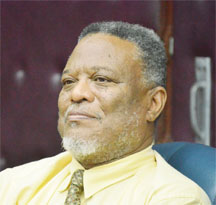Executive Director of the National Industrial and Commercial Investments Limited (NICIL) Winston Brassington says the company created to manage the construction and operation of the Amaila Falls Hydro project is winding up and its officials are departing. This was confirmed in an email communication by President of Sithe Global Brian Kubeck who said, “Yes, we are in the process of winding up. As is typical in project finance deals like Amaila, Sithe Global had been paying for the third party costs associated with the due diligence being conducted by KDB and CDB. We are no longer funding these costs. As such, neither IDB nor CDB are continuing their work on the Amaila Falls Hydropower Project.”
Meanwhile Prime Minister Sam Hinds said government may be of a mind to provide the opposition with a full project document as called for by APNU Member of Parliament Carl Greenidge and others.
This is following an official announcement by Sithe Global last Sunday that it was exiting the project because of a lack of political consensus in the National Assembly. They specifically referred to the August 7 sitting of the National Assembly where a bill and motion related to the Amaila project were passed by the government with the support of the Alliance for Change (AFC) but without the support of A Partnership for National Unity (APNU). On Friday night, President Donald Ramotar issued a statement in which he said he had issued an invitation to Leader of the Opposition David Granger to discuss the project in a last ditch bid to save it.

“[Sithe Global] is closing up its head office [in Guyana] and people there are winding up their work,” Brassington said. He noted that given the architecture of the arrangement for the project, Sithe Global was the owner of the Amaila Falls Hydro Inc (AFHI), an incorporated company.
He said that finding a new sponsor for the Amaila Falls Hydroelectric Project is not as simple as just finding another investor with US$157 million to spare. This sum was to have been Sithe Global’s equity in the project, along with the Government of Guyana’s equity of US$100 million, inclusive of what was to be spent on the road component of the project. However, it is unclear whether the loan component of the financing will ever be approved since the entity to which the money is being lent is AFHI, which currently is being wound up.
“It will be more complex than [finding a replacement for Sithe Global],” Brassington said. “AFHI is fully owned by Sithe Global… all of the discussions have been led by Sithe Global. They were the ones paying for all of the studies,” he said; “the whole arrangement has been put together by them; we played only a small role. We had a seat at the table.”
As recently as Monday of last week, APNU held fast to its stance of not supporting the project, citing a myriad reasons, including that the final cost to the consumer had not been determined, that the final project design had not yet been decided upon and that key and critical documentation had not been submitted by the government for scrutiny. In a letter which appears in today’s edition of Sunday Stabroek, APNU Member of Parliament Carl Greenidge said that government should seek to formulate a new package which is less costly in the medium and long term and would deliver affordable energy to the consumer. “They should rebuild the project from scratch using an alternative financing model and secure firmer guarantees like the tariffs and construction costs,” Greenidge wrote.
He noted that the Amaila road, a prerequisite for the larger hydro project that had been started by Fip Motilall had gone too far to be stopped, however the licence to Sithe Global for the development of the hydro should be cancelled.

Greenidge went on to say that while it was good that government had signalled it would continue to search for a financier for the project, it was important that they learnt the lesson from the “recent mess.”
He reiterated that government had not yet brought a comprehensive document on the project for the approval of the House. He said that this document should include a plan for the development of the Mazaruni, Potaro and Essequibo River basins.
Greenidge also wrote that government should publish all of the MOUs and agreements signed and licences awarded to individuals and entities in relation to hydroelectric and river basin development; and establish a specialised entity properly staffed to plan and oversee the development of all major infrastructure in Guyana.
In a comment to this newspaper yesterday, PM Hinds said, “I think the President is still focusing on trying to find a way to go forward, and I certainly hope that a way could be found so this project could go ahead.”
Hinds said that government is not at the point as yet of deciding on the future of the Amaila road, for which some US$15 million has been expended. This road is expected to cost in excess of US$30 million by the time it is completed.
He said that if the project does not go forward, GPL will see the cost of generation and providing power remaining at current levels. “The prospect is that fossil fuels would maybe in a couple of years have to make a payment towards the removal and storage of [greenhouse gases],” he said; “that will add significantly to the cost of utilising fossil fuels.”
On the calls by APNU for a comprehensive project document, Hinds responded, “There have been a series of documentation from the earliest days. I am pretty sure that we could have put together a total document. Maybe it was the assumption that sufficient is known and now that that assumption is questioned, we could probably put forward a full document on the project.”

On the criticism that the government was going ahead on the basis that Amaila was a stand-alone project, Hinds said that it was important to lock in the Amaila deal and during the four year construction phase look around to see how it could be supplemented or networked with more hydro projects. He mentioned the MOU with Brazil and said Guyana would be seeking from this about 200 to 400 megawatts from a Brazilian project to be utilised domestically.
On the levels of interest rates on the loans from the CDB and IDB – pegged at between 7 and 9 per cent – and the rate of return (ROR) for Sithe Global’s equity in the order of 19 per cent, Hinds said that the loans are commercial since Guyana having been removed from the category of Highly Indebted Poor Countries cannot receive concessional terms. He said that the ROR for Sithe Global is on the low side, since such arrangements usually require an ROR of 25 per cent.





